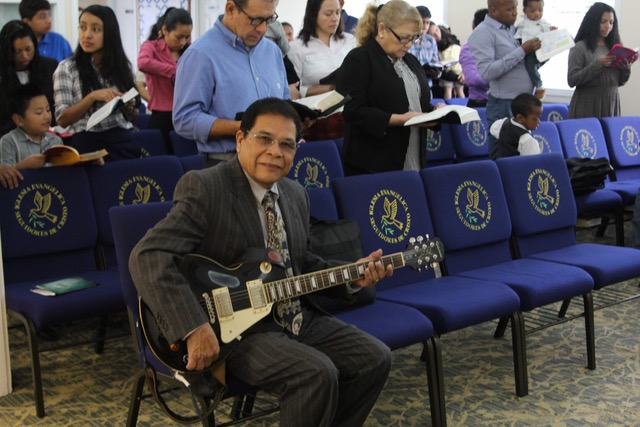This article is translated to English by Andrés Castillo. Original article appears in Mosaic News En Español: Crónica de Dos Huracanes en un Viaje a Honduras por Javier Marquez
$500 from Mosaic

The original plan was for Juan José Rivera to go back to Sarasota on November 20th, after three arduous, jam-packed weeks of work in Honduras. He’d been there for a few days, visiting Mennonite congregations, preaching and collaborating with the churches located around the city of San Pedro Sula. He carried a sum of money for basic necessities—$500—that the Mosaic Missions Committee had given him. But all plans would fall to the ground, or—more graphically described—destroyed, flooded, and erased by the hurricanes.
Tons of Water, Overflowing Currents
Pastor Juan José was visiting his native land accompanied by his wife, Elena. He had been living in the city of San Pedro Sula, in the house of members of one of the congregations he had plans to visit. Then, hurricane Iota came directly upon the city as an inferno measuring to the tons in water, with overflowing currents that made the roads disappear, creating lakes where there used to be soccer fields, and waterfalls where the hills of the city once were.

The rain wasn’t much more than a heavy downpour, but the real terror came from the wind, whose power uprooted trees and de-roofed houses. People were lost, and the turmoil was national, not only city-wide. Juan José and Elena had to seek refuge in a hotel when their host house flooded with water. They helped as much as they could, even trying to remove water from the house to rescue what was lost. At the end, they had to give up. On the way to refuge, in the street, they saw the way the people struggled unceasingly, their eyes defending themselves from the trauma of the present while trying to save their properties. Many yelled for people who wouldn’t be found, while others looked through the puddles for food, clothes, and even money. For Juan José it was frustrating to not be able to help, to watch, with his own eyes, people drowning in the currents of water that ran through the city.
An Out-of-Commission Airport
Many things were canceled, the plan was totally interrupted, but Juan José and Elena were daring more than ever to collaborate with the imminent torrent of necessity growing around them. Their mission there was to serve, although with a plan of activities defined, in that moment, after the untimely ruining of their timeline, they looked for a way to help the most they could. Also, the news that the airport was out of commission, making it impossible to return to the U.S., made it clear that there was more time for them to serve than was planned.
They traveled to the south of Honduras to the Choluteca region. There they collaborated in what they could, handing out meals, tending to the wounded—however much was needed. Many were left with nothing, and the pastor and his wife helped whoever they could. Pastor Juan José wrote a report afterwards with the specific names of those who were supposed to receive economic help from him. The original sum had doubled, leaving him to cover it with his own money at the time.
Children Rummaging through Trash, Asking for Money
One of his projects is the appropriation of a piece of arable land that he’s lent to rural dwellers in the region to work and live off of. All of this was lost, destroyed completely by the passing of the hurricanes. They now need double the help—help to restore the land, and help to work it. It was at one of these sites where pastor Juan José saw—in an event that surely duplicates itself in the entire country—children rummaging through the trash, asking for money, pulling adults by the arm, all with the same question on their lips:
– “Do you need any help with anything? Do you have any work for me?”
Finally, the pastor and his wife returned to their home in Sarasota on December 16th. The memory has remained in their hearts, just as it happened, since they left Honduras.
The opinions expressed in articles posted on Mosaic’s website are those of the author and may not reflect the official policy of Mosaic Conference. Mosaic is a large conference, crossing ethnicities, geographies, generations, theologies, and politics. Each person can only speak for themselves; no one can represent “the conference.” May God give us the grace to hear what the Spirit is speaking to us through people with whom we disagree and the humility and courage to love one another even when those disagreements can’t be bridged.
This post is also available in: Español (Spanish)
This post is also available in: Español (Spanish)
